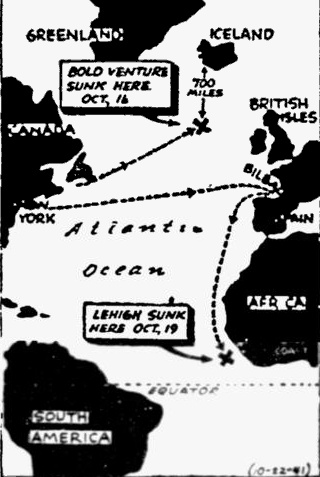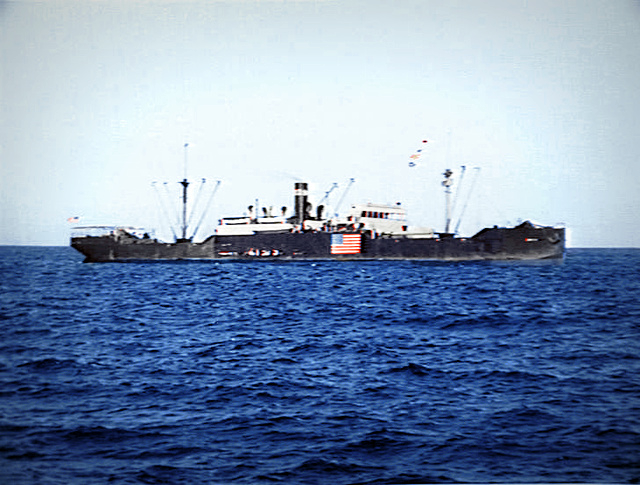The Pittsburgh Press (October 22, 1941)
Sinking toll now 10 –
2 ships sunk, Hull assails Nazi ‘terror’
Lawlessness of high seas called part of world conquest scheme
Subs strike twice

This map shows the probable routes of the freighters Bold Venture and Lehigh, the ninth and tenth U.S. ships sunk since the start of the war.
Washington, Oct. 22 (UP) –
Secretary of State Cordell Hull said at his press conference today that the sinking of the American-flag freighter Lehigh was a perfect example of:
…the Nazi policy of attempting to create a reign of terror, frightfulness and absolute lawlessness on the high seas.
The sinking of the Lehigh off the African Gold Coast last Sunday and the sinking of the American-operated freighter Bold Overture south of Iceland on Oct. 16 which were announced yesterday brought the total of American ships lost since the start of the war to 10.
Mr. Hull said the Nazi policy of terror is being demonstrated:
…especially on the Atlantic.
Raps Neutrality Act
The Secretary said it was an immediate part of the Nazi program and the movement for world conquest to commit acts on the high seas which are:
…contrary to all law and in harmony with all the definition of piracy and assassination.
Mr. Hull said that such a program was designed to threaten and intimidate nations like the United States from carrying out necessary self-defense.
He added that this was another reason why many in the government have been encouraging revision of the Neutrality Act. He said provisions of the law interfere with effective defense against such acts on the high seas, which he described as violative of every right of nations to navigate the seas.
Half World War total
The United States now has lost half the number of ships since the present war started in September 1939 that it lost before America entered World War I in 1917. 20 American ships were sunk between January 1915 and April 1917.
The Lehigh, owned by the Maritime Commission, was sunk at 9 p.m. Sunday off the West African Gold Coast.
The Bold Venture, also owned by the Maritime Commission but under Panamanian registry, was sent to the bottom off the coast of Iceland on Thursday, Oct. 16.
Attacked by submarines
No loss of life was reported in either incident.
Announcement of the sinkings came in swift sequence – one from the White House, the other from the State Department.
President Roosevelt announced the Lehigh sinking to his press conference three minutes after he had received the news himself. He said a submarine was the attacker and plainly indicated that it was a German U-boat.
An hour later, the State Department announced the Bold Venture sinking. The Maritime Commission said the ship – carrying cotton, steel, copper and general cargo – was also sunk by a submarine, apparently German. It announced the position as about 700 miles south of the western extremities of Iceland.
Entire crew saved
The Bold Venture went down some 24 hours before a submarine – presumably German – torpedoed the U.S. destroyer Kearny 350 miles southwest of Iceland with a loss of 11 seamen and injury to 10 others.
Rear Admiral Harold R. Stark, Chief of Naval Operations, told the Senate Foreign Relations Committee the Kearny was engaged in convoy duty when attacked. This aroused speculation whether the Kearny had played any part in convoying the Bold Venture and whether the same submarine which attacked the merchant ship also trailed the Kearny and subsequently torpedoed her.
A report to the Maritime Commission said 22 of the Lehigh’s crew had been picked up by the British vessel Vimy, now en route to Bathurst, a British West African port.
The commission announced today that the 22 missing seamen of the Lehigh’s crew of 44 had landed safely at Freetown, British West Africa. Arrangements were being made by the operators of the vessel to return the Lehigh crew to the United States.
The State Department said that 17 of the Bold Venture’s crew of 32 – none of them Americans – had landed at Reykjavík, Iceland. The crew consisted of five Danish, 16 Norwegian, three British, five Canadian, two Swedish and one Scotch seamen.
Former Danish ship
The Bold Venture, of 3,222 tons, was formerly the Danish ship Alssund. She was seized by the United States at Baltimore last March and was operated by the Waterman Steamship Agency of Mobile, Ala., under Panamanian registry. She sailed from New York Sept. 22.
The Lehigh, a 5,000-tonner, left New York Sept, 13, unloaded at Bilbao, Spain, and was en route to the West African Gold Coast without cargo when attacked. She was due at the Gold Coast Oct. 22, to pick up ore consigned to the United States.
Of the 10 American-owned merchant ships sunk since the start of the war, half have been sent to the bottom since Mr. Roosevelt gave the Navy orders on Sept. 11 to shoot on sight the Axis “rattlesnakes of the Atlantic.”
He said these orders apply to the Lehigh’s attacker. Undoubtedly, the submarine which destroyed the Bold Venture was also the object of a determined quest by American naval forces.
Four of the ill-fated merchant ships flew the American flag. The other six were under Panamanian registry.
The tone and inference of the President’s announcement on the Lehigh case left no doubt that German-American relations have reached a climactic point. Mr. Roosevelt was asked specifically to define the distinction between an act of piracy and an act of war.
Although he declined to answer directly, he intimated that the distinction was so fine as to require extensive thought.
Asked if the Lehigh went down in American defensive waters, Mr. Roosevelt replied sternly that the sinking occurred on the seven seas (he has said previously that ships of all nations have a right to conduct commerce on the seven seas).
Gives ‘hint’ on sinking
He was asked:
Who do you suppose sank the ship?
He countered with a question in kind – who do you suppose?
It is certain, he continued, that a submarine sank the Lehigh, and it is equally certain that the attacker was not British, Argentinian, French nor American. He said that in such cases the process of elimination is useful and suggested that reporters put on their thinking caps.
Mr. Roosevelt agreed that the sinking seems to establish that merely keeping ships out of combat zones no longer guarantees them against destruction. Bilbao, the Lehigh’s last port of call, is outside the combat zone from which American shipping is barred by presidential proclamation under the Neutrality Act.
‘Spurlos versenkt’
Mr. Roosevelt said the possibility that ships of any nation on the seven seas now may be destroyed without warning recalls the phrase first uttered during World War I by the German Ambassador to Argentina:
Spurlos versenkt – Sunk without trace.
The chief executive said in reply to a question that submarines which attack as far south as the spot where the Lehigh was sunk operate from various bases – some coming all the way from occupied sections of France; some refuel from tankers in mid-ocean, varying their refueling locations from time to time.
